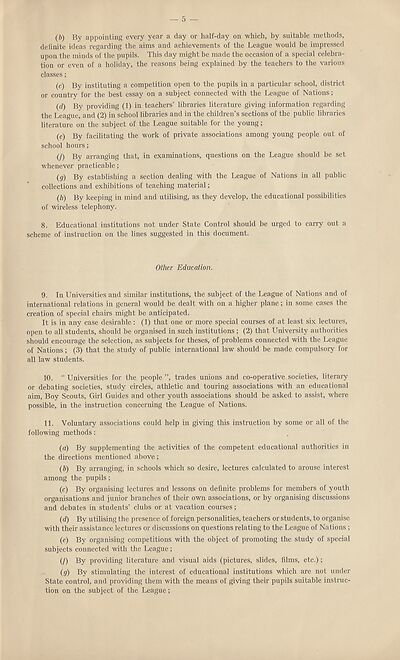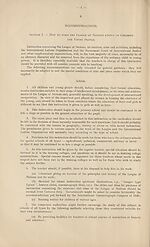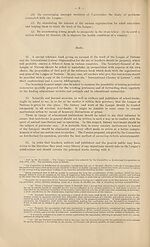Download files
Complete book:
Individual page:
Thumbnail gallery: Grid view | List view

— 5 —
(b) By appointing every year a day or half-day on which, by suitable methods,
definite ideas regarding the aims and achievements of the League would be impressed
upon, the minds of the pupils. This day might be made the occasion of a special celebra¬
tion or even of a holiday, the reasons being explained by the teachers to the various
classes;
(c) By instituting a competition open to the pupils in a particular school, district
or country for the best essay on a subject connected with the League of Nations;
(d) By providing (1) in teachers’ libraries literature giving information regarding
the League, and (2) in school libraries and in the children’s sections of the public libraries
literature on the subject of the League suitable for the young;
(e) By facilitating the work of private associations among young people out of
school hours;
(/) By arranging that, in examinations, questions on the League should be set
whenever practicable;
(g) By establishing a section dealing with the League of Nations in all public
collections and exhibitions of teaching material;
(h) By keeping in mind and utilising, as they develop, the educational possibilities
of wireless telephony.
8. Educational institutions not under State Control should be urged to carry out a
scheme of instruction on the lines suggested in this document.
Other Education.
9. In Universities and similar institutions, the subject of the League of Nations and of
international relations in general would be dealt with on a higher plane; in some cases the
creation of special chairs might be anticipated.
It is in any case desirable: (1) that one or more special courses of at least six lectures,
open to all students, should be organised in such institutions ; (2) that University authorities
should encourage the selection, as subjects for theses, of problems connected with the League
of Nations; (3) that the study of public international law should be made compulsory for
all law students.
10. “ Universities for the people ”, trades unions and co-operative societies, literary
or debating societies, study circles, athletic and touring associations with an educational
aim, Boy Scouts, Girl Guides and other youth associations should be asked to assist, where
possible, in the instruction concerning the League of Nations.
11. Voluntary associations could help in giving this instruction by some or all of the
following methods:
(а) By supplementing the activities of the competent educational authorities in
the directions mentioned above;
(б) By arranging, in schools which so desire, lectures calculated to arouse interest
among the pupils;
(c) By organising lectures and lessons on definite problems for members of youth
organisations and junior branches of their own associations, or by organising discussions
and debates in students’ clubs or at vacation courses;
(d) By utilising the presence of foreign personalities, teachers or students, to organise
with their assistance lectures or discussions on questions relating to the League of Nations ;
(e) By organising competitions with the object of promoting the study of special
subjects connected with the League ;
(/) By providing literature and visual aids (pictures, slides, films, etc.);
(g) By stimulating the interest of educational institutions which are not under
State control, and providing them with the means of giving their pupils suitable instruc¬
tion on the subject of the League;
(b) By appointing every year a day or half-day on which, by suitable methods,
definite ideas regarding the aims and achievements of the League would be impressed
upon, the minds of the pupils. This day might be made the occasion of a special celebra¬
tion or even of a holiday, the reasons being explained by the teachers to the various
classes;
(c) By instituting a competition open to the pupils in a particular school, district
or country for the best essay on a subject connected with the League of Nations;
(d) By providing (1) in teachers’ libraries literature giving information regarding
the League, and (2) in school libraries and in the children’s sections of the public libraries
literature on the subject of the League suitable for the young;
(e) By facilitating the work of private associations among young people out of
school hours;
(/) By arranging that, in examinations, questions on the League should be set
whenever practicable;
(g) By establishing a section dealing with the League of Nations in all public
collections and exhibitions of teaching material;
(h) By keeping in mind and utilising, as they develop, the educational possibilities
of wireless telephony.
8. Educational institutions not under State Control should be urged to carry out a
scheme of instruction on the lines suggested in this document.
Other Education.
9. In Universities and similar institutions, the subject of the League of Nations and of
international relations in general would be dealt with on a higher plane; in some cases the
creation of special chairs might be anticipated.
It is in any case desirable: (1) that one or more special courses of at least six lectures,
open to all students, should be organised in such institutions ; (2) that University authorities
should encourage the selection, as subjects for theses, of problems connected with the League
of Nations; (3) that the study of public international law should be made compulsory for
all law students.
10. “ Universities for the people ”, trades unions and co-operative societies, literary
or debating societies, study circles, athletic and touring associations with an educational
aim, Boy Scouts, Girl Guides and other youth associations should be asked to assist, where
possible, in the instruction concerning the League of Nations.
11. Voluntary associations could help in giving this instruction by some or all of the
following methods:
(а) By supplementing the activities of the competent educational authorities in
the directions mentioned above;
(б) By arranging, in schools which so desire, lectures calculated to arouse interest
among the pupils;
(c) By organising lectures and lessons on definite problems for members of youth
organisations and junior branches of their own associations, or by organising discussions
and debates in students’ clubs or at vacation courses;
(d) By utilising the presence of foreign personalities, teachers or students, to organise
with their assistance lectures or discussions on questions relating to the League of Nations ;
(e) By organising competitions with the object of promoting the study of special
subjects connected with the League ;
(/) By providing literature and visual aids (pictures, slides, films, etc.);
(g) By stimulating the interest of educational institutions which are not under
State control, and providing them with the means of giving their pupils suitable instruc¬
tion on the subject of the League;
Set display mode to:
![]() Universal Viewer |
Universal Viewer | ![]() Mirador |
Large image | Transcription
Mirador |
Large image | Transcription
Images and transcriptions on this page, including medium image downloads, may be used under the Creative Commons Attribution 4.0 International Licence unless otherwise stated. ![]()
| League of Nations > International > International committee on intellectual co-operation > (5) |
|---|
| Permanent URL | https://digital.nls.uk/195219320 |
|---|
| Shelfmark | LN.XII |
|---|
| Description | Over 1,200 documents from the non-political organs of the League of Nations that dealt with health, disarmament, economic and financial matters for the duration of the League (1919-1945). Also online are statistical bulletins, essential facts, and an overview of the League by the first Secretary General, Sir Eric Drummond. These items are part of the Official Publications collection at the National Library of Scotland. |
|---|---|
| Additional NLS resources: |
|

